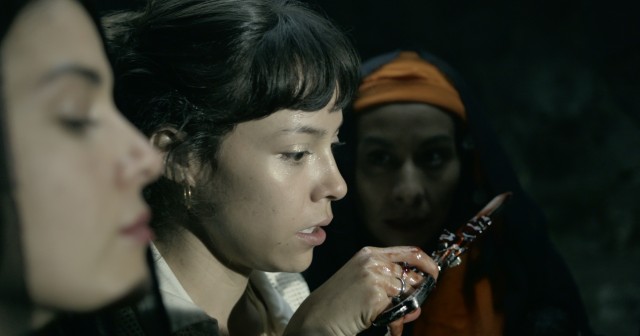Horrific, yet seductively satisfying, Ashley George’s Diabla taps into Mexican witch lore when a 17-year-old sexual assault victim finds retribution through a local coven. Using the genre framework to reveal a deeper truth about the ramifications of rape culture, the director draws from personal experience in this feminist revenge horror. While you should certainly proceed with caution, as the subject matter may be triggering to some viewers, George’s empathetic approach adds a visceral commentary to a violent encounter that all too many women have experienced.
“It was a personal experience as a woman living in a world full of toxic masculinity”
The original idea for Diabla came from the film’s producer, Maya Korn, who is no stranger to the horror genre with such credits as #NoFilter and Deathcember. Diabla was Korn’s Columbia MFA producing thesis and the original spark for the film came from her rage toward President Trump’s disparaging comments about women and Mexicans during his time in office. Korn then pitched the project in the New York Women Filmmakers group, which led to her tapping George to direct the project.
“Making Diabla was hard”, the director reveals, “it was a personal experience as a woman living in a world full of toxic masculinity and having to face my own traumatic experiences”. Having previously worked mostly within the coming-of-age genre, it was a natural jump for her to dive into darker subject matter within the horror framework. While developing Diabla, the filmmaker met with many Mexican people, including producers and journalists, to find out what it’s like to live as a woman in Mexico. What she found was that femicide, rape, and oppression in the workforce and at home are a norm in a patriarchal society where machismo reigns supreme. While these issues aren’t unique to Mexico, the way in which these issues are dealt with are quite startling.

Ruth Ramos as Nayeli (center) – the young girl who turns to a coven to exact revenge on her attacker.
Featuring an incredible cast, its Ruth Ramos‘ performance as Nayeli that is truly unforgettable. The driving force behind the film, it’s hard to imagine anyone else playing her role. Although her character was originally written as a 12-13 year old girl, when George, who considered the casting process as one of the most fulfilling parts of making Diabla, met Ramos they made an instant connection and rewrote the role with her co-writer, Alonso Diaz-Rickards, to fit the actress. With the director explaining how the chemistry with the rest of the cast was vital in making the shoot go so smoothly, it goes to show how important it is to have the right people working on a project – especially an indie.
Bridging the gap between feminism and witchcraft, with a gruesome ending that will not disappoint, Diabla is a body horror in a number of ways, and for that reason, it’s a story that will stay with you long after watching. Witchcraft inarguably has always been synonymous with evil, but nowadays it refers to girl power. While Diabla skews into the supernatural, the true magic of a coven is having a network of supportive women to lift each other up and face a world of adversity together. So when Nayeli is harmed and rejected by the male figures in her life, it’s a coven of witches that come to her rescue. This is what 21st century feminism looks like, with or without a sacrifice around a fire under the moonlight.
“I may never even dream of exacting revenge in reality”
“With Diabla I aim to tackle women’s issues around the globe while paying tribute to Mexican land and culture,” George says. While the horror that Nayeli experiences is a tragically universal experience, the director hopes women will continue to find their voice, as Nayeli does, perhaps even with the help of their own coven. “I may never even dream of exacting revenge in reality, as we do in this film, but I can make a movie about it and propel what may come across as a little girl into a big, ferocious feminine spirit that finds her power, as I know we all will,” George concludes.

 Chelsea Lupkin
Chelsea Lupkin